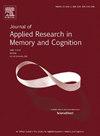这是什么时候发生的补充材料?约会最近和远程个人事件的准确性指标
IF 2.6
2区 心理学
Q1 PSYCHOLOGY, EXPERIMENTAL
Journal of Applied Research in Memory and Cognition
Pub Date : 2022-09-01
DOI:10.1037/mac0000065.supp
引用次数: 0
摘要
对时间的记忆往往是不完美的。我们调查了最近和遥远的个人事件的日期准确性指标。在研究1中,78名参与者记录了过去3到11周内发生的大约20件事,在研究2中,40名参与者记录了3到5年前发生的大约25件事。对于日期验证,从参与者的伴侣那里获得事件,他们记日记(研究1)或从个人记录中检索事件(研究2)。在这两项研究中,我们发现自信、表明已知日期的约会策略以及与时间地标的直接联系与更高的约会准确性相关。高度的重要性、直接经验和嵌入在较长时期内的事件表明对近期事件的测年准确性更高;较高的生动性与较远事件的定年准确性有关。我们的研究结果表明,信心、测年策略和现象学特征可以提供有用的测年准确性指示。本文章由计算机程序翻译,如有差异,请以英文原文为准。
Supplemental Material for When Did This Happen? Indicators of Accuracy for Dating Recent and Remote Personal Events
Memory for time is often imperfect. We investigated indicators of dating accuracy for recent and remote personal events. In Study 1, 78 participants dated approximately 20 events from the past three to eleven weeks, and in Study 2, 40 participants dated approximately 25 events three to five years old. For date verification, events were obtained from participants’ partners, who kept a diary (Study 1) or retrieved events from personal records (Study 2). In both studies, we found that confidence, dating strategy indicating known dates, and a direct connection with temporal landmarks were associated with higher dating accuracy. High importance, direct experience, and events embedded within extended periods indicated higher dating accuracy for recent events; high vividness was associated with higher dating accuracy for remote events. Our results suggest that confidence, dating strategy, and phenomenological characteristics can provide useful indication of dating accuracy.
求助全文
通过发布文献求助,成功后即可免费获取论文全文。
去求助
来源期刊

Journal of Applied Research in Memory and Cognition
PSYCHOLOGY, EXPERIMENTAL-
CiteScore
5.30
自引率
9.50%
发文量
119
 求助内容:
求助内容: 应助结果提醒方式:
应助结果提醒方式:


